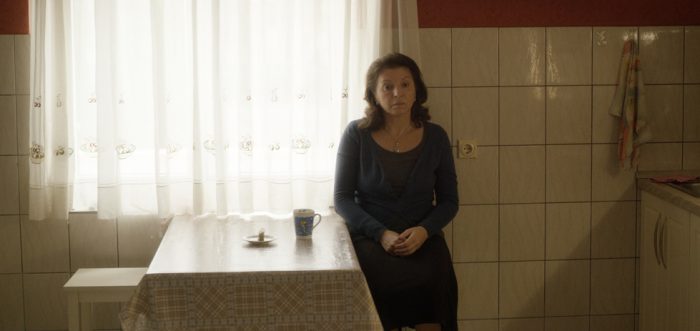
This year’s Sydney Film Festival boasted a well-earned influx of outstanding female talent, from Athina Rachel Tsangari to Kelly Reichardt and Maren Ade to Chantal Akerman. Alongside them all, the entry of Serbian activist/actress Mirjana Karanovic (Cabaret Balkan, Underground) is a gratifying inclusion.1 Moral intrigue, cognitive dissonance and what many in post-war Serbia choose to ignore, are exposed in A Good Wife, Karanovic’s restrained yet thewy directorial debut.
Karanovic, clad in layers of middle-class, middle-aged subtlety through the earthy-toned skirt suits and muted makeup of Boris Caksiran’s costume design, plays Milena—wife, mother and unlikely sex-symbol—comfortable in a median life. The fragile corporeality of body, family and state converge in her discovery of a VHS tape containing repressed acts of genocide against Bosnian civilians involving her gruff yet solicitous husband, Vlada (Boris Isakovic, of The Paradise Suite; often typecast as a subjugator, he is absorbingly vulnerable as a loving partner). A Good Wife explores the world of Milena as an intermediary between her husband and everyone around him, including their children, their friends and others in his former paramilitary unit, all now living in the same small Vojvodina suburb near Belgrade, all in varying states of PTSD. On her intent with Milena, Karanovic commented that, as an activist as well as an actress, she wanted to play, “the woman who actually is the beloved wife of one of the people involved in the war operation in Bosnia.” Over a decade since its end, Vlada’s compatriots are scrutinised for their actions during the war, with the tension running through the latter sections of the film gearing around questions of approaching soldiers turned civilians and militants turned murder victims.
It’s clear Karanovic’s co-screenwriters Stevan Filipovic and Darko Lungulov (who directed Karanovic in Here and There) mirror the conflict’s far-reaching implications in the early diagnosis of Milena’s breast cancer. Yet there is no histrionic joy from the melancholy lens trained on Vlada and Milena’s enigmatic relationship to their past. Instead, Karanovic ties it to their aging bodies. It’s more than a metaphor, as the film is wholly focused on Milena, centering her in a progressive world of consequence, feminism and moral justice, and in turn circumventing more predictable and tired depictions of middle-aged women. Milena struggles to relate to her daughter Natasha, (Hristina Popovic), a human rights advocate for an NGO in Belgrade, whose intelligence and level headedness repeatedly unsettle her mother’s dyed-in-the-wool family ethics. Milena strives to be everything for her war veteran husband, yet she cannot withdraw from Natasha as he has.
As a film with a femme slant, A Good Wife investigates a woman approaching age, her body and what allowances she has for personal growth. After applying makeup with a delightfully intimate smile in the film’s first scene, Milena wriggles into a modest but figure hugging dress and pulls a funny pose for a chuckling Vlada. In a later scene, she regards herself in a mirror again, patting lotion onto her face gently and pulling her nightgown down to push up her breasts before fucking her husband quickly, but passionately. It’s later, when her doctor insists, “Why did you wait so long? You’ve turned 50. You should be having breast checks regularly from now on” that Milena is shocked by the implications of her indecision. Soon after first viewing Vlada’s grim VHS record, she turns it off gingerly, not ready to witness realities of the dead and buried. However, throughout the film she returns periodically to watch a little more each time, unable to ignore the past she and her husband have lived, a past that has now turned them both into “old people.” In the latter half of the film, Milena oscillates between assuring those around her “Everything will be ok” and anxiously asking her husband “Will everything be ok?” When she witnesses TV panellists discussing the need for an investigation into Bosnian War crimes, she questions whether this “everything” includes just her family, or Serbia at large.
The conflict within Milena over whether or not to be a good wife to her husband, or perhaps even what a good wife is, is beautifully and gently conveyed, with the love, horror and sadness running deep through their relationship, fluctuating in and out of focus like a heartbeat. Karanovic and Isakovic’s performances really sing in the more intimate moments, the widescreen lensing of Bosnian d.p. Erol Zubcevic (Our Everyday Life, Tigers) probing their facial vulnerabilities with surgical precision. Milena’s turmoil is reminiscent of Tilda Swinton’s Emma Recchi in I Am Love, a wife struggling to find herself in a relatively happy marriage, the camera focus scoping forwards and back in time with the turbulence on film. It’s little twinges like this, Milena’s struggle to focus on the multitude of complications surrounding her pleasant life, combined with the camera work constantly foregrounding her that really accentuate A Good Wife’s classically-styled eloquence.
The most successful choice A Good Wife makes comes in its aporetic approach to resolution. Milena has found the tape, been diagnosed with breast cancer and Karanovic leaves us with the closing shot of her naked body on a hospital gurney. Yet as she is prepared for surgery, Milena’s expression is sacrificially impassive. There is a finality to her determined moral-consciousness, but also, as her left breast is swabbed with blood red iodine, a sense that with this exorcism, she has cut out her own heart, too.
Around the Staff
| Jake Moody | |
